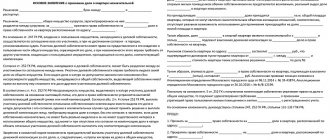How to correctly file a claim for eviction in court?
Drawing up a statement of claim is a fundamental procedure necessary to apply to the judicial authorities. If you draw it up incorrectly, the judge will simply not accept it for proceedings.
The statement of claim is carried out in accordance with the requirements of the law, which are enshrined in Article 131 of the Code of Civil Procedure of the Russian Federation.
Conventionally, the claim can be divided into three semantic parts - introductory, descriptive, operative. Let us consider in detail the contents of each of them.
Introductory part
The first part of the document should contain the following information:
- the exact name of the judicial authority where the claim is filed;
- personal and contact information of the plaintiff;
- personal data of the defendant;
- document's name.
That is, it contains general information about the parties to the conflict.
If the plaintiff or defendant is a legal entity, then the full name of the organization should be indicated in the “plaintiff” column, and the personal data of the representative of this company should be written below
Descriptive part
The second part of the document must contain specific circumstances in connection with which there was a need to go to court.
Namely:
- data on the ownership of the residential premises (certificate of registration of ownership, social tenancy agreement);
- information about everyone who lives in the apartment that the plaintiff wants to vacate, an indication of the legality and circumstances of their occupancy;
- grounds for which it is necessary to evict the defendant (for example, divorce, end of the lease agreement, unauthorized occupation, etc.);
- an indication of whether an attempt was made to resolve the issue out of court, as well as the results of these attempts;
- links to documents that confirm your case;
- an application to hear in court the testimony of witnesses who can confirm the illegality of the tenants’ presence in the plaintiff’s apartment.
This part is probably the most important, since it contains the basic data that the court will need to make a decision. Therefore, you should not give in to emotions and write about your relationship with the defendant or give him an unflattering description. This may give a contradictory impression to the court. Describe the essence of the matter clearly and concisely.
The operative part
This part is the final one and summarizes the entire document.
Here you need to specify the following:
- your claims;
- their motivation with references to the norms of current legislation;
- the date of drawing up the document, the personal signature of the plaintiff (if this is a legal entity, then the signature of the representative);
- list of documents that are attached to the claim.
The claim must be drawn up in triplicate (if there is more than one defendant, then additional copies must be made for each of them).
When a claim for eviction from an apartment is required, how to draw it up and submit it correctly
A claim for forced eviction can be filed in court against the owner of a residential premises in connection with his infringement of the rights and interests of neighbors or when the land plot on which the residential premises is located is seized for state and municipal needs (is it possible to evict the owner from the apartment?).
- a copy of the claim for the defendant;
- receipt of payment of state duty;
- power of attorney, if there is a representative;
- documents confirming the facts stated in the statement of claim;
- documents confirming the fact of warning the defendant about illegal behavior and violation of the rules of residence.
20 Mar 2021 klasterlaw 50
Share this post
- Related Posts
- How much does one cube of hot water cost according to the meter in Krasnoyarsk
- Insurance Payments for Apartment Repairs in RGS
- For what debt can bailiffs take a car?
- Additional payments in the Russian Emergency Situations Ministry for State Awards
Documents attached to the claim
In order to confirm that he is right, the plaintiff must attach a package of documents to the application sent to the court.
| No. | List of documents |
| 1 | Certificate of ownership of the apartment |
| 2 | Social tenancy agreement |
| 3 | Plaintiff's passport |
| 4 | Apartment card |
| 5 | Notice of pre-trial settlement |
| 6 | Certificate of marriage or divorce |
| 7 | Birth certificates of children |
| 8 | Receipt for payment of state duty |
| 9 | Other documents demonstrating the legality of the plaintiff’s claims |
Since the grounds for eviction can be very different, the package of documents in each specific case can differ quite significantly.
To determine what information you need to provide specifically for you, it is best to seek advice from a professional lawyer
State duty
An eviction claim is considered non-property, so the state duty for any eviction claim will be 300 rubles.
Eviction lawsuits are quite complex. An incorrectly drawn up statement of claim, the absence of any document, or an incorrect sequence of actions on the part of the plaintiff can lead to the court refusing to satisfy the claims.
To avoid mistakes when evicting a violator, it is necessary, at least at the first stage of the procedure, to obtain advice from an experienced lawyer. He will tell you what steps to take first, what steps to take later, draw up claims, help collect the necessary documents and, if necessary, represent your interests in court.
This is important to know: Appealing a determination to return a statement of claim
FREE CONSULTATIONS are available for you! If you want to solve exactly your problem, then
:
- describe your situation to a lawyer in an online chat;
- write a question in the form below;
Procedure for filing a claim
Before filing a statement of claim, you must try to conclude a pre-trial agreement with the defendant. This must be done by sending a letter with a simple notification to him with a written request to vacate the living space. Even if you don’t receive an answer, you can present it as evidence in court.
So, if it was not possible to reach an agreement, then you need to understand which judicial authority to contact to protect your rights. Such claims are considered by the district court of general jurisdiction at the place of residence of the defendant (at the address of the apartment in which he illegally resides).
The completed statement of claim along with the necessary package of documents must be sent to the court.
This can be done in the following ways:
- in person to the court office;
- through a representative;
- courier delivery service;
- by postal service with a simple notification and a list of attachments.
It should be understood that the period for consideration of a claim begins from the moment it is received by the court, and not from the date on which it was drawn up.
After the statement of claim is received by the judge, he must decide within five days whether to accept it for proceedings or leave it without consideration. The plaintiff is informed of this decision in writing.
Procedure
If the owner has grounds to evict a tenant, the first step should be to notify the tenant that the latter is violating the rules of residence and may be evicted. Sometimes such notice is enough for the offender to stop illegal actions and the eviction procedure is not required.
Expert opinion
Grigoriev Egor Kirillovich
Legal consultant with 7 years of experience. Specializes in criminal law. More than 3 years of experience in protecting legal interests.
If the tenant did not heed the warning and continues to violate the rules, then the next step of the landlord should be an ultimatum to vacate, indicating the time period within which the tenant must move out.
This is important to know: Cancellation of a loan claim
From a council apartment
In this case, eviction is possible in two ways:
- the tenant is evicted from this residential premises, in return he is given another, of equal or not value;
- a tenant is evicted from their apartment without being provided with other housing.
The grounds for eviction under the first option may be:
- Recognition of the apartment as unfit for habitation. In this case, the tenant must be provided with another residential premises of equal size in return.
- The building in which the apartment is located is subject to demolition. Equal housing must also be provided in return.
- The house is scheduled for major renovation. Equivalent living space in return.
- The tenant does not pay for his/her accommodation for more than six months. In return, residential premises should be provided at the rate of six square meters per resident.
Other living quarters are not provided upon eviction for the following reasons:
- The apartment was not used for its intended purpose, for example, it was converted into an office, retail space, warehouse.
- The residents occupied the apartment without permission.
- The parents have been deprived of parental rights and, by court, are excluded from living together with their children.
- The lease agreement has expired or been terminated.
- Residents carried out illegal redevelopment. In such cases, if the redevelopment could not be legalized, the municipality may terminate the social tenancy agreement.
Not the owner registered in the residential premises
First, it is necessary to remove such a citizen from registration. If the tenant does not agree to do this voluntarily, then it is possible to discharge him only through the court. It must be borne in mind that if deregistration of an adult resident is quite simple, then deregistration of a minor child will require considerable effort and sufficient grounds.
Illegally residing citizen
If the owner of the apartment has enough evidence that the tenant is living in the premises illegally, then evicting him will not be difficult. If the demand for eviction does not take effect, the owner files a claim, attaches evidence of the illegality of living in the citizen’s apartment, and the court makes a decision on eviction.
For debts on utility bills
If the tenant owes more than six months of utility bills, then it will be enough:
- provide evidence of debt to the court;
- invite employees of the management company or housing and communal services as witnesses.
Former spouse who is not the owner of the residential premises
If the residential premises were owned before marriage, then evicting the ex-spouse after the divorce will not be difficult. It will be enough to provide the court with the title documents for the residential premises and a divorce certificate as evidence.
From a communal apartment
If one of the residents in a communal apartment causes problems and inconvenience to neighbors, violating their rights, then the latter will need to write a class action for the forced eviction of the rowdy, in which they indicate all the violations of the “noisy” neighbor and evidence of these violations.
How to compose it correctly?
The inability to resolve the issue amicably leads the owner to court. The question arises: how to fill out a claim correctly so that the court does not have any questions?
Contents of a claim for eviction from a residential premises in 2021:
- Upper right corner (“header”) – indicate the name of the court, full name, contacts and telephone numbers of the parties;
- Below in the center is the name of the claim document;
- Descriptive part – information about the apartment, room; ownership; information about residents;
- Reasons for eviction - what rights were violated; were there any attempts to resolve the dispute at the pre-trial stage; what articles the plaintiff refers to;
- Petition to summon witnesses to court (if necessary);
- List of attachments - documents that the plaintiff attaches to the claim;
- The lower section is the date the claim was filed; plaintiff's signature with transcript.
A common mistake is filing a claim in a single copy on behalf of the applicant. In fact, the plaintiff will be required to submit at least three copies of the application , depending on the number of participants in the court hearings (Article 132 of the Code of Civil Procedure of the Russian Federation). Failure to comply with this requirement results in refusal of registration.
This is important to know: Recognition of ownership of a gas pipeline: judicial practice








